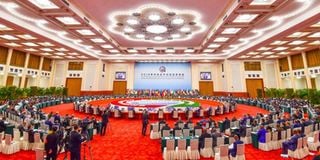China focuses on think-tanks to strengthen ‘unbreakable’ ties with Africa

African heads of state and government the FOCAC 2018 Summit in Beijing, China.
Beijing is turning focus on non-governmental organisations in Africa to cement what it calls “unbreakable” ties with the continent, even in the face of the Covid-19 pandemic and the rising talk on the debt burden.
And officials in China see think-tanks and private research organisations as better ways of strengthening influence in Africa, away from the usual government-to-government contacts.
At a gathering of African and Chinese think-tanks in Beijing, officials said China will be keen to ward off negative narratives from the West about China’s role in Africa.
Deng Li, China’s Assistant Minister for Foreign Affairs told the audience of the need for sincere relations including deeper ties in all sectors including political links.
“We have been able to treat each other with sincerity and keep deepening mutual political trust,” he told the two-day conference last weekend, according to a speech made available to the media.
“China-Africa ties are unbreakable. No attempt by anyone, at any time or under any pretext to disrupt China-Africa cooperation will succeed.”
Rebranding relations
It showed China’s continued rebranding of its relations with Africa, a continent it has strong influence on but which critics accuse Beijing of weighing down with debt. The meeting was China’s ninth in a series under the Forum for China-Africa Cooperation (FOCAC).
But it came on the backdrop of talks about China’s debt owed by the continent. Some Chinese scholars in the meeting argued that there is little chance of it being a burden because bilateral debt is only a fifth of loans handed to the continent.
“There is misunderstanding that China has many loans to Africa,” Zhou Yuyuan, an associate research fellow at the Shanghai Institute of International Studies told CGTN, China’s state-owned international broadcaster.
“China's portion in African debt, mainly bilateral, is only 20 per cent.”
Beijing is Africa’s biggest trading partner, but it is also the biggest bilateral creditor, loaning Africa some $150 billion, mostly to build infrastructure projects. Some countries have been unable to repay the loans on time.
Cancel some debt
In June, President Xi Jingping pledged to cancel some government debt owed by “relevant” African countries, including those heavily troubled by Covid-19.
“For those African countries that are hardest hit by the coronavirus and are under heavy financial stress, China will work with the global community to give them greater support, by such means as further extending the period of debt suspension, to help them tide over the current difficulty,” Xi told his audience among them South African President Cyril Ramaphosa, Kenya’s Uhuru Kenyatta and Senegal’s Macky Sall and Ethiopian Prime Minister Abiy Ahmed.
At the weekend, Chinese officials suggested they will focus on working with non-governmental entities especially in addressing health emergencies like the Covid-19 pandemic as well as unspecified poverty alleviation programmes.
Post-pandemic era
“China is willing to cooperate with Africa in the post-pandemic era to find out solutions in climate change, poverty alleviation, free trade and so on,” said Wu Peng, China’s director-general for the Department of African Affairs.
“We are glad to hear voices and take advice from both Chinese and African scholars,” added Dr Wu, who until May this year was China’s Ambassador to Kenya.
Beijing officials say Chinese companies “have been actively sharing with Africa their experience in fighting Covid-19” using cloud computing, artificial intelligence and developing cloud economy, Wu added.
The think-tanks were meeting ahead of next year’s FOCAC Summit of heads of state and government. In 2018, Beijing pledged USD60 billion worth of grants, loans and aid to Africa through FOCAC. Private firms were to raise USD10 billion while the government was to raise the rest USD5 billion in aid loans and grants every year, USD15 billion in special funds and another USD20 billion worth of new loans.
It also marked a rebrand of China’s focus and included industrial promotion, infrastructure connectivity, trade facilitation, green development, training, health care, cultural exchanges, and peace and security





